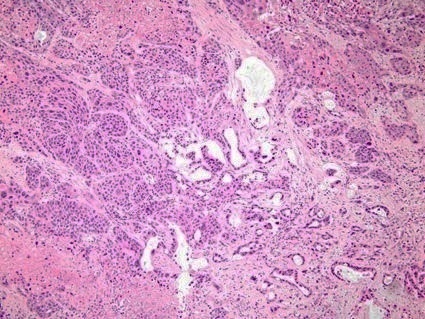adenosquamous carcinoma on:
[Wikipedia]
[Google]
[Amazon]
Adenosquamous carcinoma is a type of

Adenosquamous carcinoma
entry in the public domain NCI Dictionary of Cancer Terms Carcinoma Infectious causes of cancer {{oncology-stub
cancer
Cancer is a group of diseases involving abnormal cell growth with the potential to invade or spread to other parts of the body. These contrast with benign tumors, which do not spread. Possible signs and symptoms include a lump, abnormal bl ...
that contains two types of cells: squamous cells (thin, flat cells that line certain organs) and gland-like cells. It has been associated with more aggressive characteristics when compared to adenocarcinoma in certain cancers. It is responsible for 1% to 4% of exocrine forms of pancreas cancer.
__TOC__Diagnosis

Light microscopy
Microscopy is the technical field of using microscopes to view objects and areas of objects that cannot be seen with the naked eye (objects that are not within the resolution range of the normal eye). There are three well-known branches of micr ...
shows a combination of gland-like cells and squamous epithelial
Epithelium or epithelial tissue is one of the four basic types of animal tissue, along with connective tissue, muscle tissue and nervous tissue. It is a thin, continuous, protective layer of compactly packed cells with a little intercellu ...
cells. On immunohistochemistry
Immunohistochemistry (IHC) is the most common application of immunostaining. It involves the process of selectively identifying antigens (proteins) in cells of a tissue section by exploiting the principle of antibodies binding specifically to a ...
, it is typically positive for CK5/6, CK7 and p63, and negative for CK20
Keratin 20, often abbreviated CK20, is a protein that in humans is encoded by the ''KRT20'' gene.
Keratin 20 is a type I cytokeratin. It is a major cellular protein of mature enterocytes and goblet cells and is specifically found in the gast ...
, p16 and p53. On genetic testing
Genetic testing, also known as DNA testing, is used to identify changes in DNA sequence or chromosome structure. Genetic testing can also include measuring the results of genetic changes, such as RNA analysis as an output of gene expression, or ...
, KRAS
''KRAS'' ( Kirsten rat sarcoma virus) is a gene that provides instructions for making a protein called K-Ras, a part of the RAS/MAPK pathway. The protein relays signals from outside the cell to the cell's nucleus. These signals instruct the cel ...
and p53 are typically altered.
References
External links
Adenosquamous carcinoma
entry in the public domain NCI Dictionary of Cancer Terms Carcinoma Infectious causes of cancer {{oncology-stub